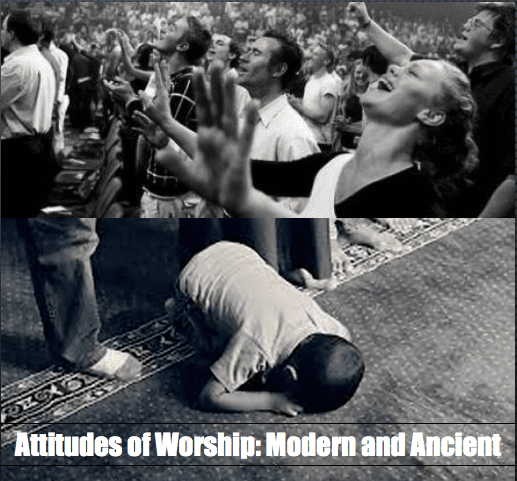- Luke 18:9-14
- Also He spoke this parable to some who trusted in themselves that they were righteous, and despised others: “Two men went up to the temple to pray, one a Pharisee and the other a tax collector. The Pharisee stood and prayed thus with himself, ‘God, I thank You that I am not like other men—extortioners, unjust, adulterers, or even as this tax collector. I fast twice a week; I give tithes of all that I possess.’ And the tax collector, standing afar off, would not so much as raise his eyes to heaven, but beat his breast, saying, ‘God, be merciful to me a sinner!’ I tell you, this man went down to his house justified rather than the other; for everyone who exalts himself will be humbled, and he who humbles himself will be exalted.”
The parable of the Pharisee and Tax Collector is “old hat” to most members of the church, yet one that needs to be dawned afresh. Within this parable the Lord emphasized attitudes of worship, self-justification, true justification, and forgiveness by means of comparison and contrast. Though Israel had engaged in worship before God for centuries, many had forgotten the purpose of both their worship and religion. May the words of this parable serve as a reminder to the church, and may the people of God avoid the pitfalls of the old covenant people.
The main focus of the parable is found in its introduction, “to some who trusted in themselves that they were righteous, and despised others.” Salvation is in large part a matter of attitude, as is worship. Salvation does not come from within ourselves; it is the gift of God (Romans 6:23). We must never therefore buy into the mindset of the Pharisees that we have merited our salvation. The Pharisees were condemned because they failed to keep the Law, elevated human traditions above the Law (Matthew 15:1-10), and trusted in themselves (their merit – Luke 18:9), not because they studied or kept taught the Law improperly (Matthew 23:2-3, 23-24).
Learn the lesson of the parable; no man can merit salvation nor think himself better than others, for we have all sinned and fallen short of the grace of God (Romans 3:23). An attitude of humility and unworthiness must possess us as we reflect on both salvation and worship.
Worship is an act of reverence directed toward God as a matter of praise for His creative, salvific, merciful, and gracious power. Acts of worship must be God approved for we are told it is possible to offer both acceptable and vain worship (Matthew 15:9). The Greek word for worship is proskuneo and means, “to prostrate oneself, to kiss the hand of one in token of reverence, or kneeling or prostration to do homage or make obeisance.” (Thayer, p. 548) The emphasis drawn out by the term is that of paying homage and reverence toward God while recognizing our unworthiness in His presence. The concept of worship and the attitude behind it must be remembered in order to understand the point of the Lord’s parable.
Christ draws several contrasts between the two men who went up to pray. The first contrast is one of attitude. The Pharisee trusted in self, while the tax collector exalted God. Notice the Pharisee makes five references to self (I), while the tax collector makes only one personal reference (and a pejorative one at that). One exalted self, while the other exalted God.
Do the words of our worship exalt God or self? I ask this question in all sincerity and hope that we will reflect on the words we pray and sing. Are our songs and prayers focused on our personal wants, desires, and accomplishments? Or are they directed at God and His wants, desires, and accomplishments (Matthew 6:9-13)?
Though I am not entirely opposed to the musical style of modern praise and worship songs, I do feel many of them express a shift in focus from God to self. As an example, one famous song begins, “Lord I lift your name on high, Lord I love to sing your praises. I’m so glad you’re in my life, I’m so glad you came to save me.” God’s name should certainly be lifted high and is worthy of praise, and we should most definitely be thankful for the Lord’s salvation. Yet all such concepts could better be expressed in a way that does not emphasize the action of the individual and what he or she does for and toward God.
As another illustration, I recently listened to a new song written for a large meeting that within two verses made sixty references to self and only thirty to God. It seems our focus sometimes misses the mark and needs to be redirected.
The second contrast between the two men was that of posture and position. Notice the position and posture of the two worshipers in the parable: One entered boldly into the temple, while the other stood afar off. One stood with great confidence, while the other smote his breast. The posture of the men reflected their attitude in worship and the same rings true today.
Worship is about paying homage to God, not exalting ourselves into the presence of God. Worship is also about reverence rather than intimacy. The posture of prayer and worship in the Bible is often that of prostrating oneself on the ground as an expression of unworthiness. As we have already noted, this emphasis of reverence through prostration is even reflected in the definition of worship. An exceptional example of worship is found in Deuteronomy 9:18 where Moses prostrated himself for forty days and nights while making intercession for the people because of their disobedience. Moses’ humility and reverence before God is later reflected as God the Son prayed in the same manner in the Garden of Gethsemane (Matthew 26:39).
The posture of denominations is to stand with hands raised as they praise God and draw near into His presence with a warm feeling of personal intimacy based on a false understanding of 1 Timothy 2:8. Such a concept does not reflect the general practice of worship in the Bible and even seems quite foreign. Even within the intimate psalms of David a tone of reverence and obeisance is always reflected. Though there were occasions where David danced for joy before the Lord (2 Samuel 6), such was the exception and was also performed under the direction of the Spirit. Such an example is not authoritative for Christians today (Colossians 3:17).
The parable of the Lord also contrasts the source of the men’s confidence. Though the parable says nothing negative about the accomplishments of the Pharisee, it does withhold justification in the final analysis because of his self-righteous attitude. Skill or dilligence, without proper motivation, does not render proper worship or service to God. The tax collector, by contrast, is not commended for his unrighteousness, yet leaves justified because he sought the forgiveness of God on God’s terms. If we desire the justification of God, we must cast off all self-worth, beg for the mercy of the Father, and place our complete trust in Him. Our attitude and obedience must reflect the words of Jesus in Luke 17:10,
- “So likewise you, when you have done all those things which you are commanded, say, ‘We are unprofitable servants. We have done what was our duty to do.’ ”
May God bless His people and may they live in reverence and extreme gratefulness of His grace and mercy.


 RSS Feed
RSS Feed
